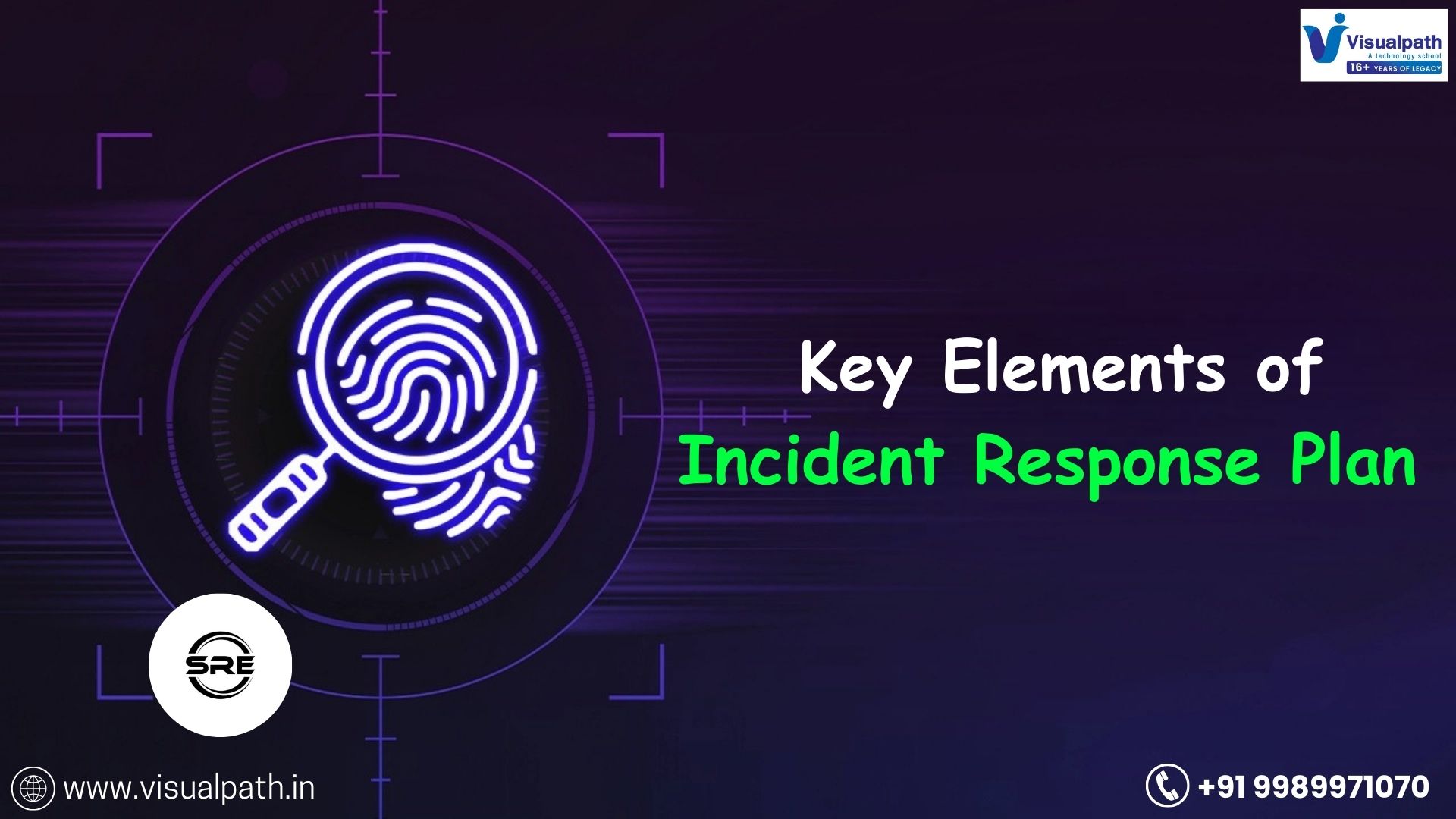Introduction:
Site Reliability Engineering (SRE) Training, having a robust incident response plan is a critical component of ensuring a system’s reliability and resilience. As organizations increasingly rely on digital services and infrastructure, the importance of quick, efficient, and coordinated responses to incidents cannot be overstated. Site Reliability Engineering Training emphasizes the significance of incident management, making it a key focus for engineers aiming to maintain the health of production systems. This article explores the key elements of a good incident response plan, how it supports the objectives of Site Reliability Engineering (SRE), and how professionals can hone their skills through SRE Course and Site Reliability Engineering Online Training.
The Importance of an Incident Response Plan in SRE
An incident response plan outlines the steps an organization must take when faced with a system outage, failure, or disruption. A well-defined plan ensures that when incidents occur, there is a clear, organized, and rapid response. This minimizes downtime, prevents prolonged disruptions, and aids in quick recovery. SRE engineers play a pivotal role in this process, as they are responsible for maintaining the availability, performance, and reliability of systems. Through the Site Reliability Engineering Training, engineers are equipped with the tools and knowledge needed to implement an effective incident response plan.
Key Elements of a Good Incident Response Plan
Clear Incident Identification
The first step in responding to an incident is identifying it. This involves monitoring system performance, alerting engineers when something goes wrong, and categorizing the incident based on its severity. Incident identification should be based on metrics such as downtime, latency, system errors, or user impact.
In the Site Reliability Engineering Online Training, engineers learn how to set up monitoring tools and define alert thresholds for various system components. This allows for early detection of issues before they escalate into critical incidents.
Defined Roles and Responsibilities
A good incident response plan should clearly outline the roles and responsibilities of all team members involved in the process. In a typical SRE team, various stakeholders, including system administrators, engineers, and communication specialists, must collaborate to resolve incidents. Ensuring everyone knows their role during an incident is essential for a coordinated and effective response.
SRE professionals learn about the coordination required between cross-functional teams in Site Reliability Engineering Training, emphasizing how team members must respond to incidents according to their responsibilities. Clear communication protocols ensure everyone involved is on the same page, which is crucial for fast and effective problem resolution.
Escalation Procedures
When an incident is detected, the response plan should include escalation procedures to ensure that the right people are notified at the appropriate time. For example, if an incident is not resolved within a set time, it should be escalated to a senior engineer or manager. Escalation helps prevent delays in incident resolution and ensures that the right expertise is brought in when necessary.
In an SRE Certification Course, professionals are trained on the importance of defining clear escalation paths and how to structure these procedures in an organized manner. Escalating incidents based on predefined triggers allows the team to act more swiftly and effectively.
Communication Plan
Clear communication is vital during an incident response. An incident response plan should define how communication flows during an event, both internally within the engineering team and externally to stakeholders such as management, customers, and end-users. The plan should specify when to notify customers of outages, how to provide updates, and how to manage post-incident communications.
Through Site Reliability Engineering Online Training, engineers are equipped with the knowledge to develop communication strategies that mitigate user frustration and maintain trust. SRE engineers are taught how to use various communication channels, such as status pages, emails, or social media, to keep stakeholders informed.
Root Cause Analysis
Once an incident is resolved, a thorough post-incident review should be conducted to determine its root cause. The root cause analysis (RCA) is critical in preventing future incidents by identifying the underlying issues. It is essential to capture lessons learned and document them for future reference.
SRE professionals are trained to conduct post-incident reviews through Site Reliability Engineering Training. These reviews focus on analysing incidents in-depth to uncover any system weaknesses or gaps in the response process, allowing teams to improve their infrastructure and processes continuously.
Recovery Procedures
Once the incident has been identified, and the cause is understood, the recovery process begins. A well-defined recovery procedure should include steps for restoring service, prioritizing critical systems, and testing fixes to ensure the incident does not recur.
An important aspect of the recovery process in SRE is implementing and testing automated rollbacks, failover mechanisms, and redundancy systems. Engineers learn how to design these systems during Site Reliability Engineering Online Training, ensuring that they are prepared to recover from incidents as efficiently as possible.
Documentation and Knowledge Sharing
A good incident response plan should include mechanisms for documenting incidents, actions taken, and resolutions. This documentation is essential for knowledge sharing and improving incident management practices. It allows teams to learn from past incidents and refine their processes for future situations.
SRE engineers learn the importance of maintaining a robust incident log during Site Reliability Engineering Training, enabling teams to continuously refine their response plans and ensure better performance in the future. This documentation should be easily accessible and organized for quick retrieval when needed.
How to Improve Incident Response through SRE Training
The importance of a good incident response plan cannot be overstated in SRE. To implement a successful plan, engineers must have the right skills and knowledge. SRE Course and Site Reliability Engineering Online Training provide professionals with the tools they need to respond effectively to incidents. These training programs focus on building a strong foundation in monitoring, incident detection, troubleshooting, and collaboration, ensuring that engineers can manage incidents efficiently when they arise.
The SRE Certification Coursegoes beyond theoretical knowledge by offering practical lessons and scenarios that mimic real-world incidents. Through hands-on experience, engineers can learn how to navigate complex incidents and develop a deeper understanding of SRE practices.
Conclusion
A well-defined incident response plan is essential for organizations that aim to maintain high reliability, availability, and performance in their systems. As organizations increasingly rely on complex infrastructure, the role of Site Reliability Engineers becomes more crucial in ensuring that disruptions are minimized and that systems recover quickly from any incidents. An effective incident response plan not only helps mitigate the impact of failures but also serves as a learning tool for improving systems and processes over time.
Through Site Reliability Engineering Training, professionals are equipped with the necessary skills to handle incidents systematically and efficiently. The SRE Course teaches engineers how to design incident management frameworks, how to prioritize tasks, and how to collaborate effectively during an incident. Additionally. Moreover, the post-incident review process plays a key role in continuously improving the incident response plan. By identifying the root causes and learning from each incident.
Ultimately, the ability to swiftly and effectively respond to incidents is at the heart of maintaining a trustworthy service and ensuring customer satisfaction. For organizations looking to scale their infrastructure and improve operational resilience, investing in Site Reliability Engineering Training and pursuing an SRE Certification Course is an invaluable step. This knowledge will not only help professionals handle incidents more effectively but also drive the culture of reliability within the organization, ensuring long-term success and business continuity.
Visualpath is the Best Software Online Training Institute in Hyderabad. Avail complete Site Reliability Engineering (SRE) worldwide. You will get the best course at an affordable cost.
Attend Free Demo
Call on – +91-9989971070
WhatsApp: https://www.whatsapp.com/catalog/919989971070/
Visit: https://www.visualpath.in/online-site-reliability-engineering-training.html




